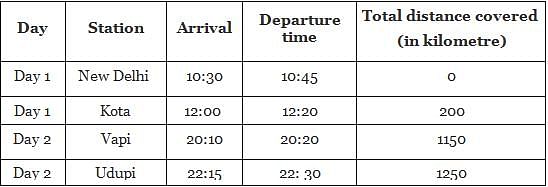TN TET Paper 1: Environmental Studies Test - 4 - TN TET MCQ
30 Questions MCQ Test - TN TET Paper 1: Environmental Studies Test - 4
Which of the following sentences is correct about multicropping?
"Desert Oak" is a tree whose roots go deep into the ground till they reach the water. The depth of these roots is nearly 30 times the height of the tree. This tree is found in:
| 1 Crore+ students have signed up on EduRev. Have you? Download the App |
The teacher wants his child to teach about the national food items with active involvement. He asked children to find out famous food items in their localities. The teacher wants to
In the villages of Bihar, many farmers do bee-keeping and collect honey to earn extra money. The best time to start bee-keeping is:
Which among the following is not a natural calamity?
Which of the following is not true with respect to potatoes?
Durga lives in a village and cooks food on a chulha (earthern stove) using wood or cow dung cakes as fuel. She has been suffering from severe cough for the last three months. This may be due to the:
Which of the following is a dance as well as a festival?
Psychological environment broadly explains the natural and social environments and learning and informational environments. In order to explain this psychological environment, what was used by Kurt Lewin?
In which of the following part of our country do people grow eatables such as tapioca and coconut in their courtyards, and they find food prepared using these to be very tasty?
Pragya noted down the following information about her journey to her in-law's house at Udupi.

The correct conclusion is:
Directions: Answer the following question by selecting the most appropriate option.
Which of the following makes a correct pair?
Pochampally is a village which is famous for the special cloth which is also called Pochampally. This village is a part of _____.
A. Suryamani Bhagat was born in Odisha.
B. She had joined to work for the 'Jharkhand Jungle Bachao Andolan'.
C. She had another friend ‘Mirchi’, who stayed with her day and night.
The correct statements are:
Ramesh is studying about the various geographical barriers of the world. He also reads about the Palk Strait. The Palk Strait lies between
Which is the best period for the people of Bihar state to start bee-keeping?
Which of the following statements regarding the Forest Act is/are true?
S1: It was enacted on 29 December 2006.
S2: It provides that people who have been living in the forests for at least 50 years have a right over the forest land and what is grown on it.
The gaseous envelope surrounding our planet is known as
Environmental factors that shape the development of a child include all of the following except:
In the water cycle, clouds are formed by which of the following processes?
Giving importance to individual experiences of children in an EVS class will benefit the teacher
What kind of challenges can a teacher face when using experiment method of teaching?
I. Advance Preparation
II. Many children may have to be mere observers
III. Enabling children to have theoretical knowledge
Fahrenheit is the official temperature scale in the USA. What is the frequently used temperature scale in India?
Some birds can see four times as far as we can see. These birds are:
A EVS teacher is using the example, "Nirmala’s father, a farmer, has been invited by her teacher to help children understand better about plants in general and weeds in particular." He uses
Directions: Answer the following question by selecting the most appropriate option.
Environmental factors that shape the development of a child include all of the following, except
In which colour photosynthesis occurs most in plants?
Assertion (A): While teaching EVS a teacher to keep in mind the prior knowledge and previous experiences of children.
Reasoning (R): The learning of new knowledge becomes easier if it is related to the previous experiences and knowledge of the children.

















